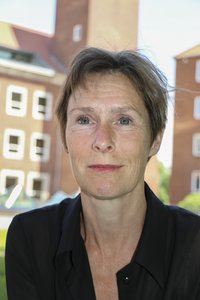The Research Communication Award 2021

Professor MSO Eva Gulløv, DPU, Aarhus University
We can learn a lot about a society and a culture by studying children. This is a central insight in the work of Eva Gulløv, a professor with special responsibilities (MSO) at the Danish School of Education, Aarhus University, who is this year’s recipient of the Aarhus University Anniversary Foundation Research Communication Prize. However, she doesn’t see herself as an expert: she is an interpreter, and her task is to identify the received truths and dilemmas in cultures and societies.
What’s more, this year’s recipient of AU’s research communication award is sceptical of the word ‘communication’ itself.
“That makes it sound as if I’m an intermediary in relation to a truth that is to be conveyed to others. But in my view, it’s not a linear process; something happens in the transaction. And the conclusion is the result of a collaboration,” she said.
She understands herself as an interpreter of societies and people in specific cultures. Most often the people she collaborates with are social educators or teachers, in addition to professionals in municipal government. And instead of assuming the role of an expert and pronouncing conclusions, she sees her task as presenting analyses and interpretations of connections – as well as pointing out dilemmas.
“I’m not an expert; they’re the ones who are experts in their field. My task is to present dilemmas and ? as they appear from different perspectives, on the background of my analyses and interpretations. I identify forces and assumptions that can be difficult to capture if you’re a stakeholder in a particular situation,” she explained, and went on to add that her goal was to clarify the different perspectives, exploring how they harmonise and clash as a prelude to discussion.
Children help us understand society
Throughout her career, Gulløv has disseminated her research to academic colleagues and has written articles and books that are widely used in courses at universities and university colleges. In 2012, she published the book Civilisererende institutioner, which was co-authored with her DPU colleague Laura Gilliam. It was subsequently translated to both Norwegian and English. The topic of the book is the dominant child-rearing values in Danish schools, daycare centres and families; according to Gulløv, certain community-oriented ideals exert a powerful influence in these contexts.
Generally speaking, we can learn a lot about our society by looking at its children, Gulløv said:
“Children are an absolutely central part of a society’s continuity. After all, cultural values must be transferred from one generation to another. That’s why looking at children and the investments made in children is a really fruitful topic if you’re interested in understanding a society’s values, dominance relationships and potential transformations.”
Children in rural areas
Her most recent book, Opvækst i provinsen – om dem, der bliver, og dem, der rejser, co-authored with John Gulløv, explores how the educational system is implicated in the power imbalance between urban and rural areas, with a focus on the push and pull factors operating in small rural communities that contribute to the ‘mobility imperative’ that leads young people to migrate to urban areas. The fieldwork on which the book is based included observation in kindergartens and rural communities as well as interviews with parents, social educators, executives, consultants and administrators.
“It’s about what encourages children and young people to remain in or move a way from a rural community, and it’s an example of how an issue such as the relationship between rural and urban areas can be approached from an unconventional angle by focusing on children,” Gulløv explained, and added:
“By looking at what children think is valuable or high-status, we can get an idea of what their society’s values are – which are not always explicitly acknowledged. It’s this kind of insight about culture that interests me.”
Contact
Professor MSO Eva Gulløv
The Danish School of Education (DPU), Aarhus University
Mail: evag@edu.au.dk
Tel.: 9350 8147